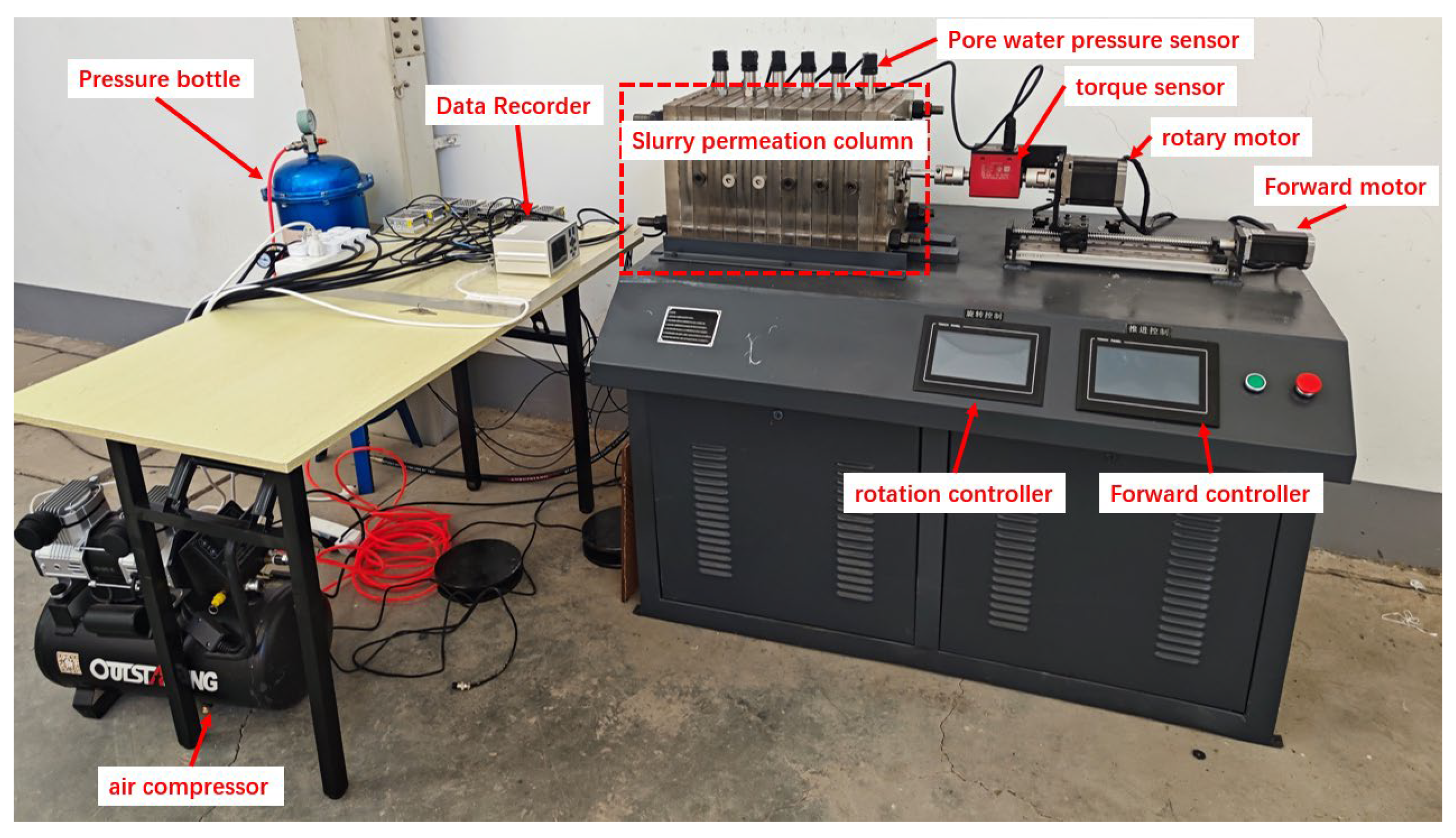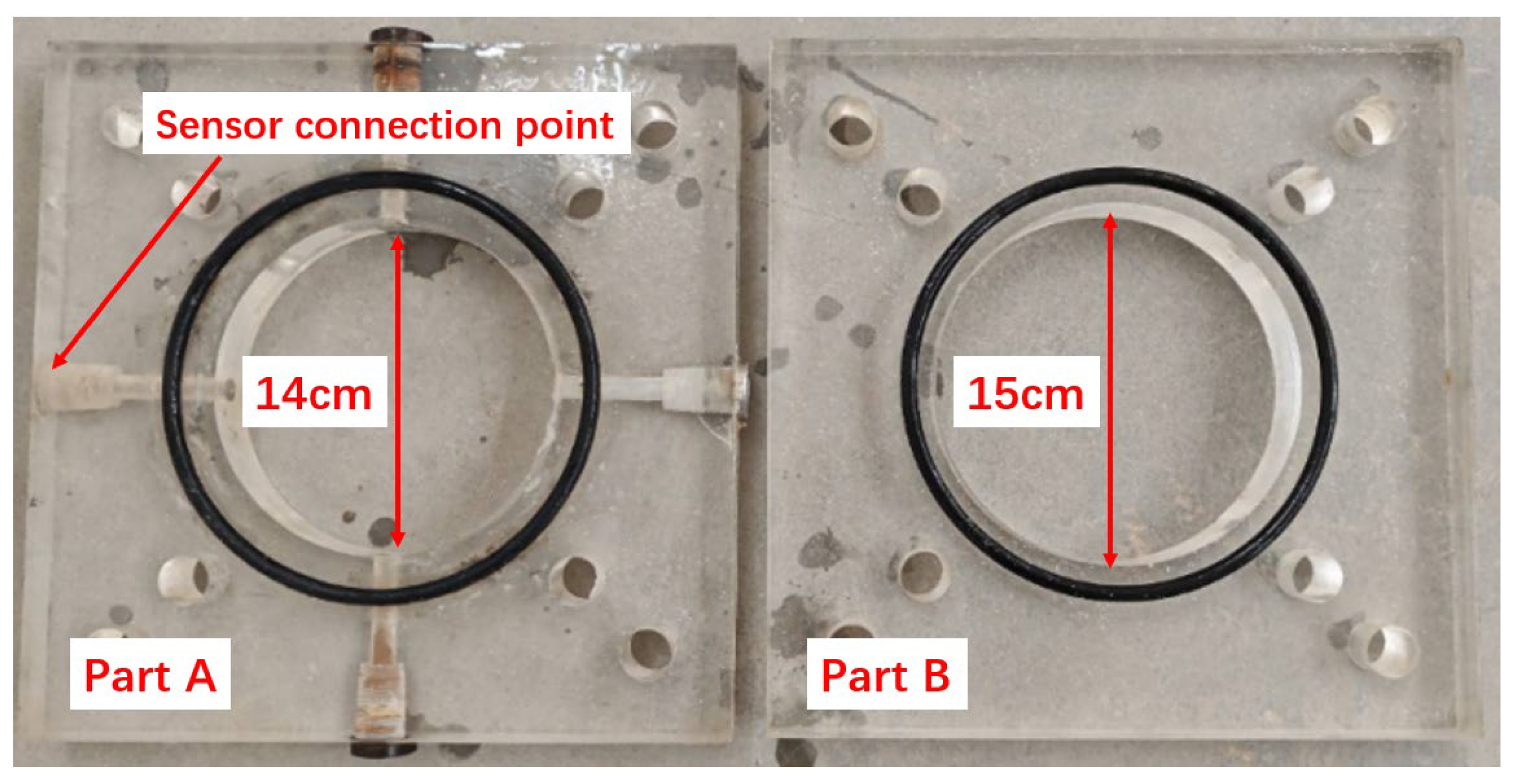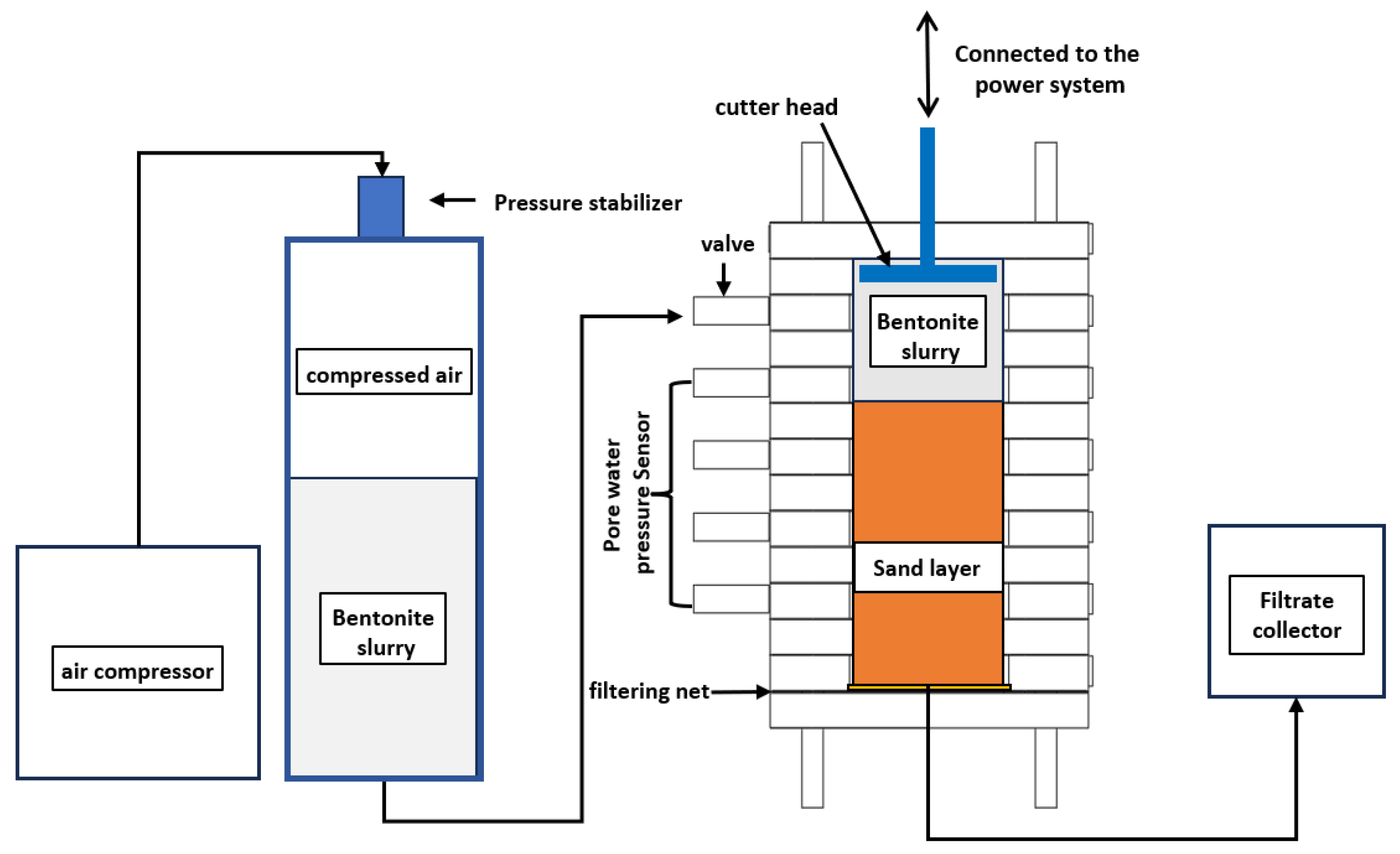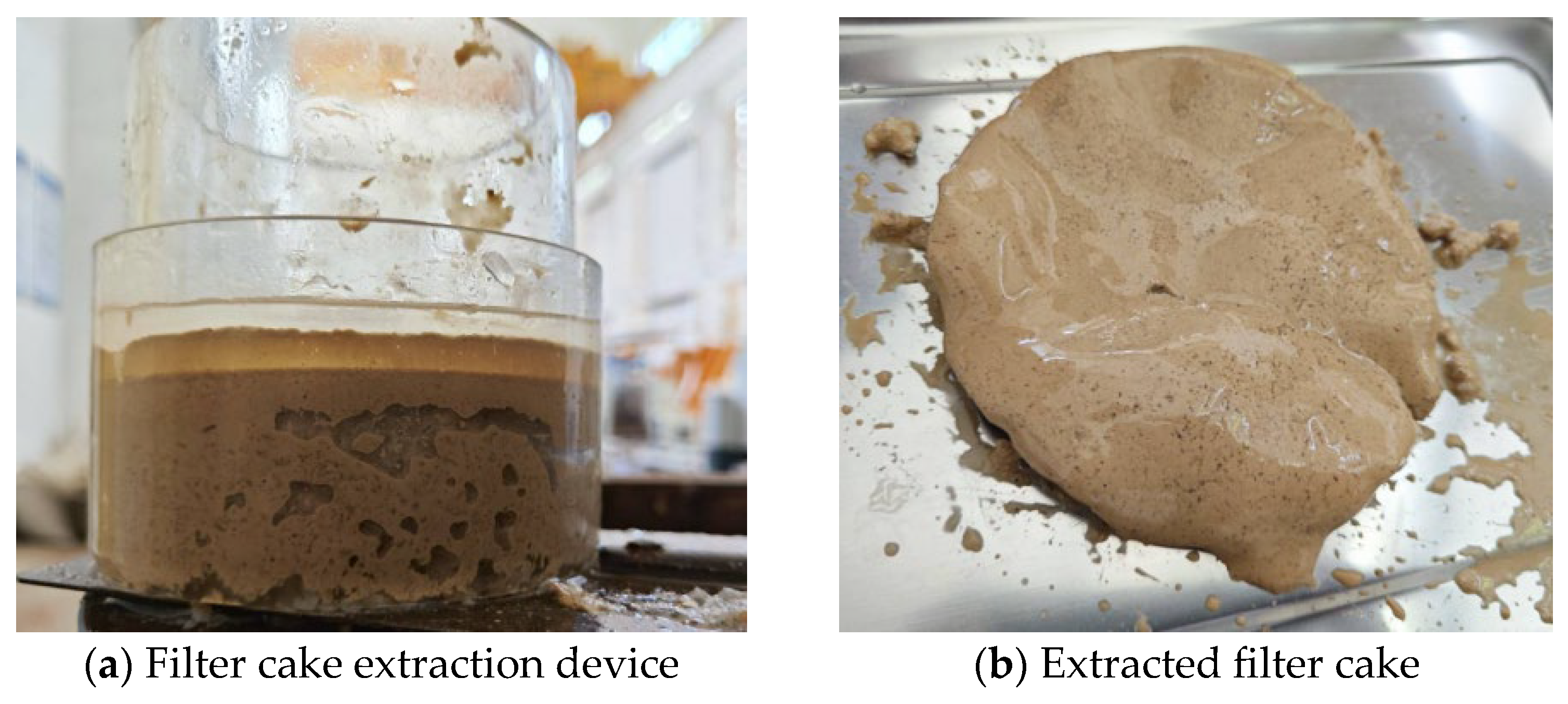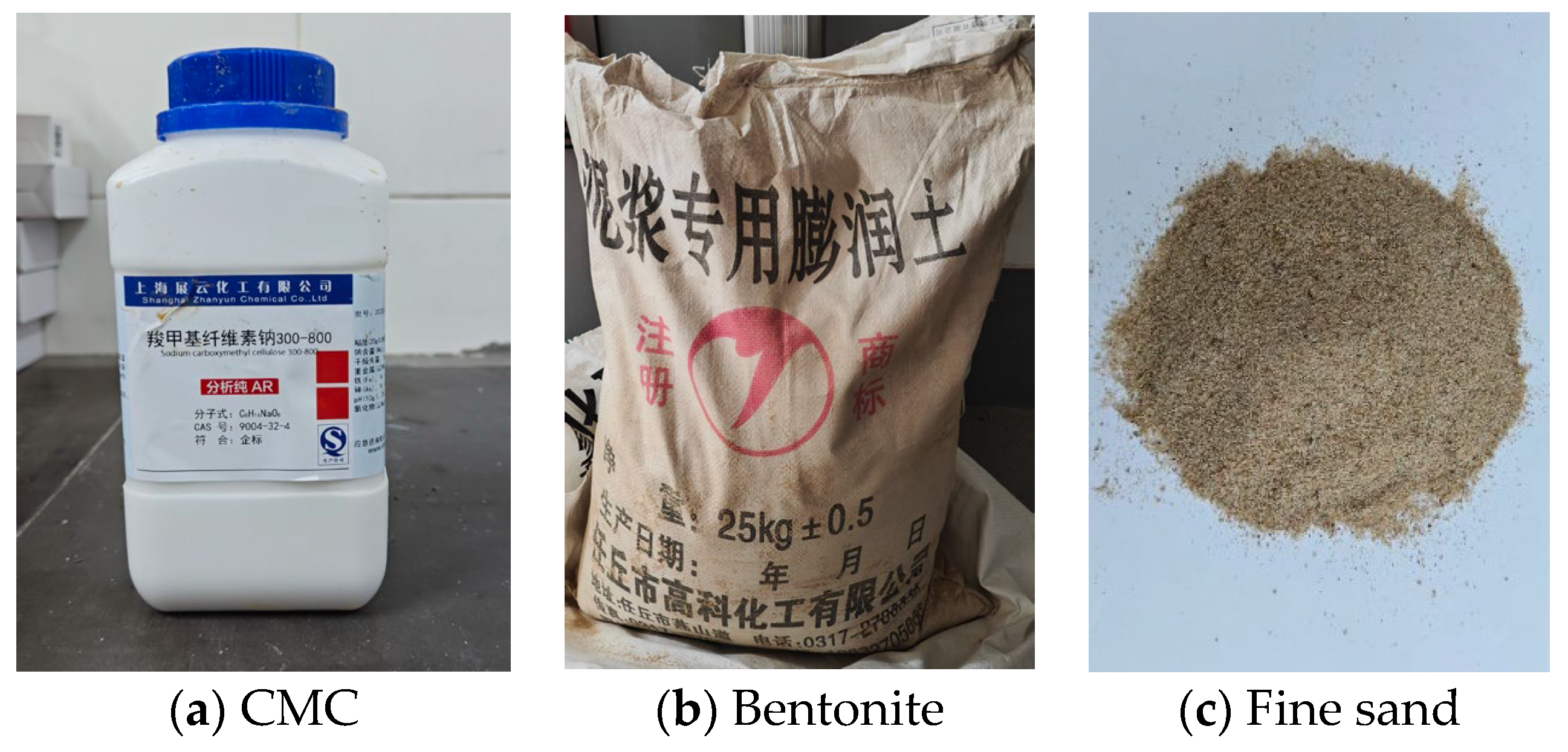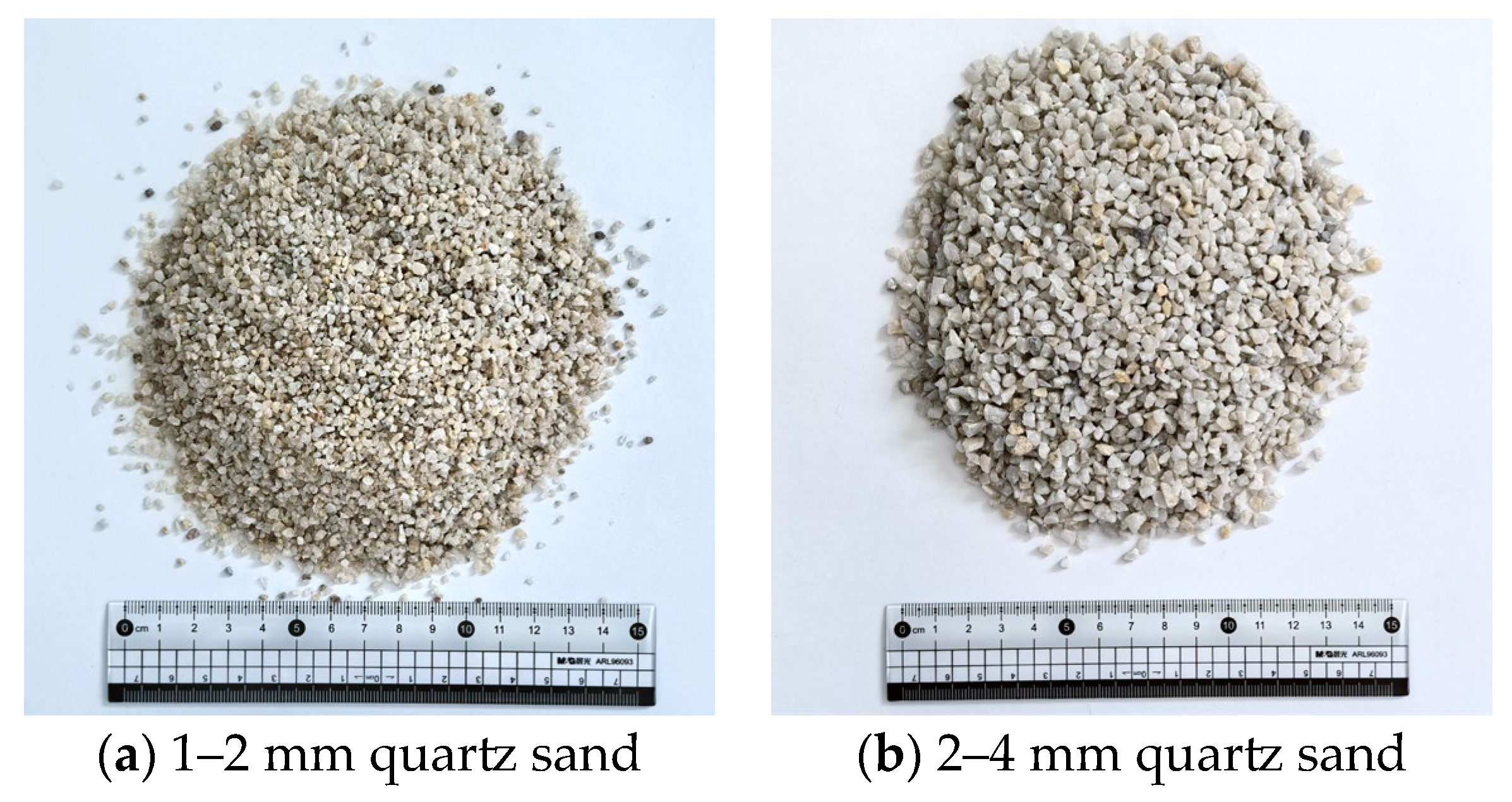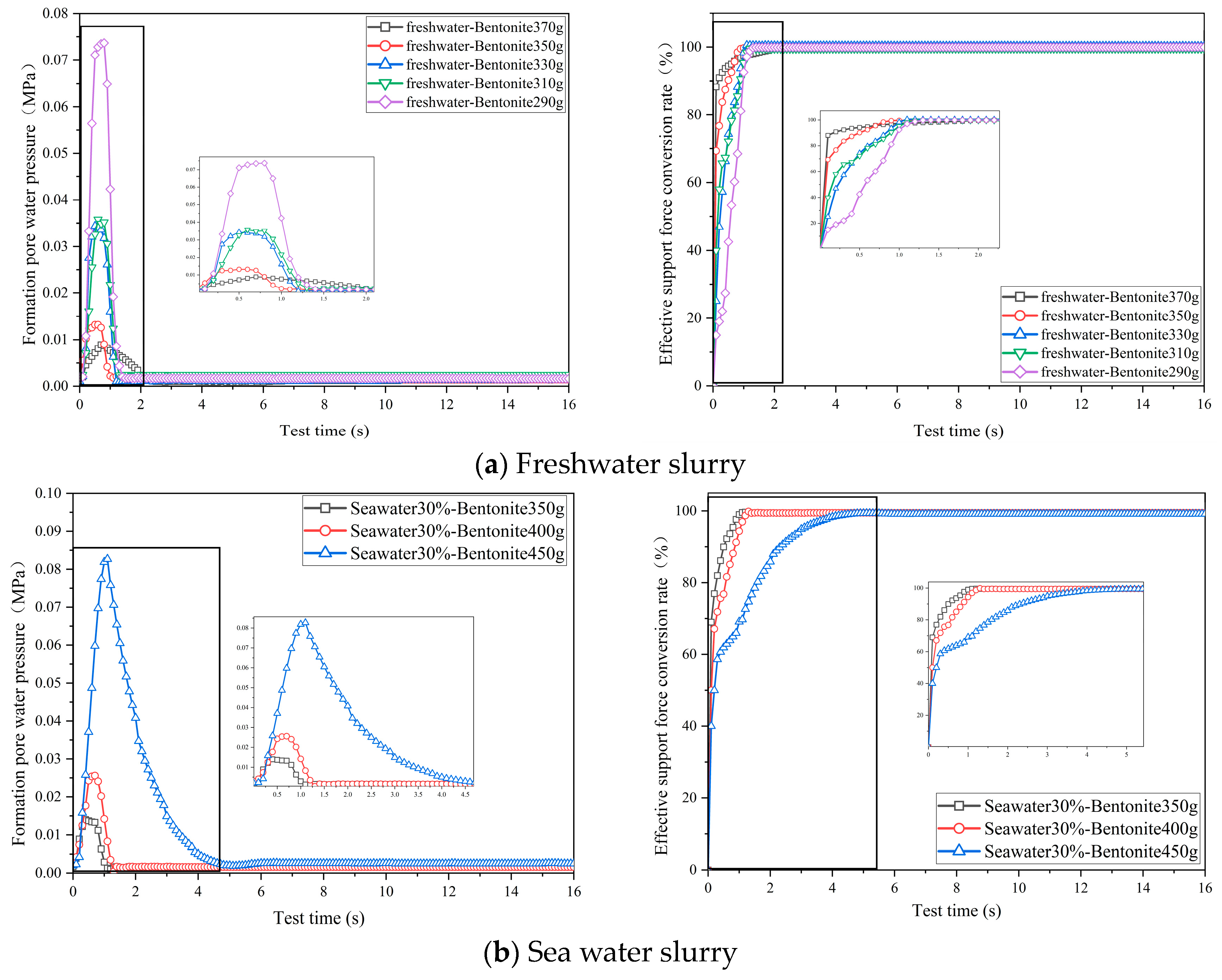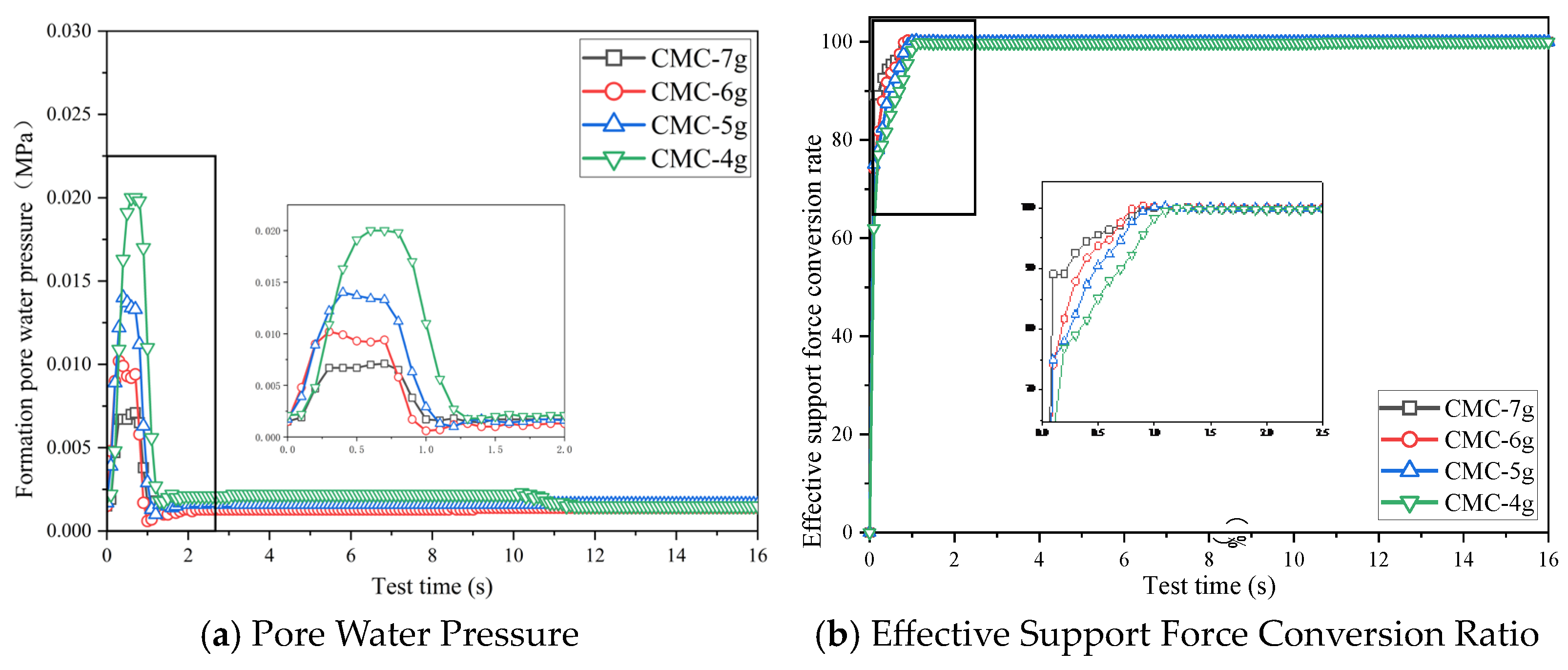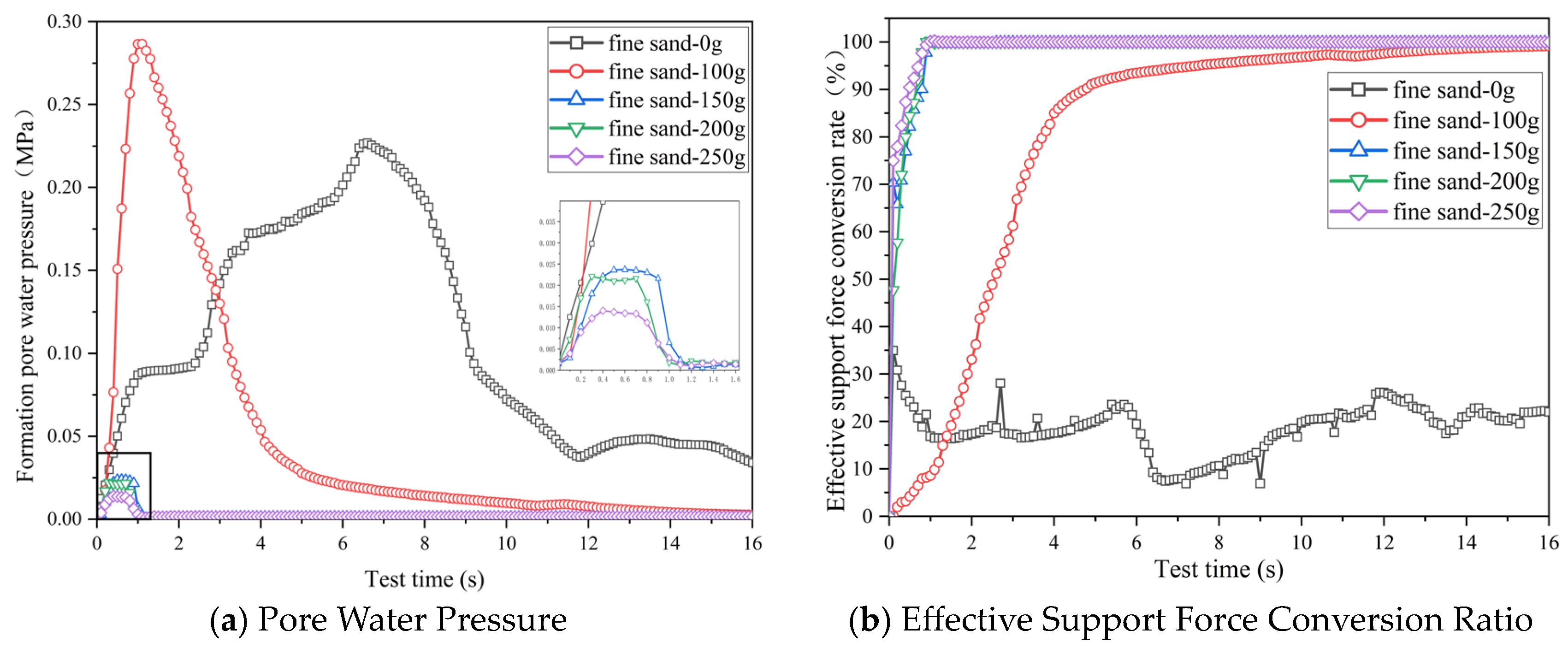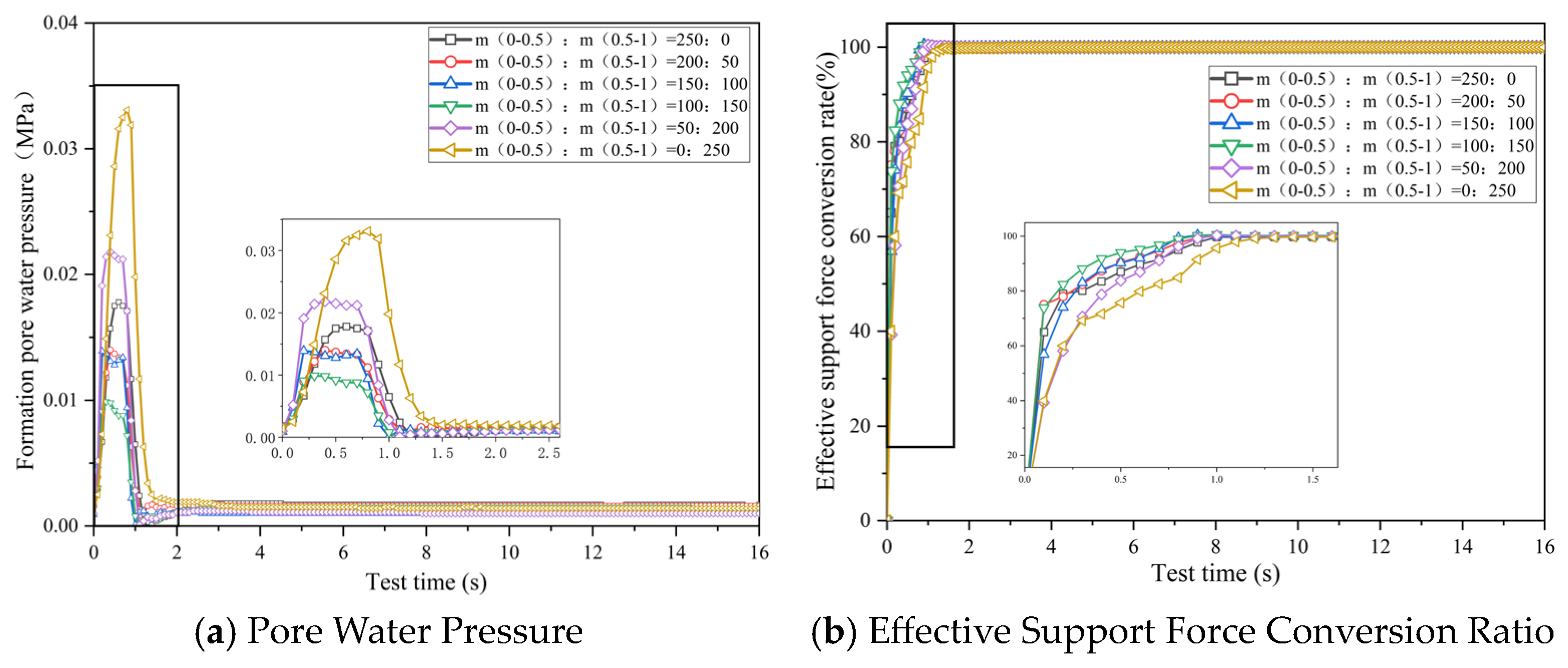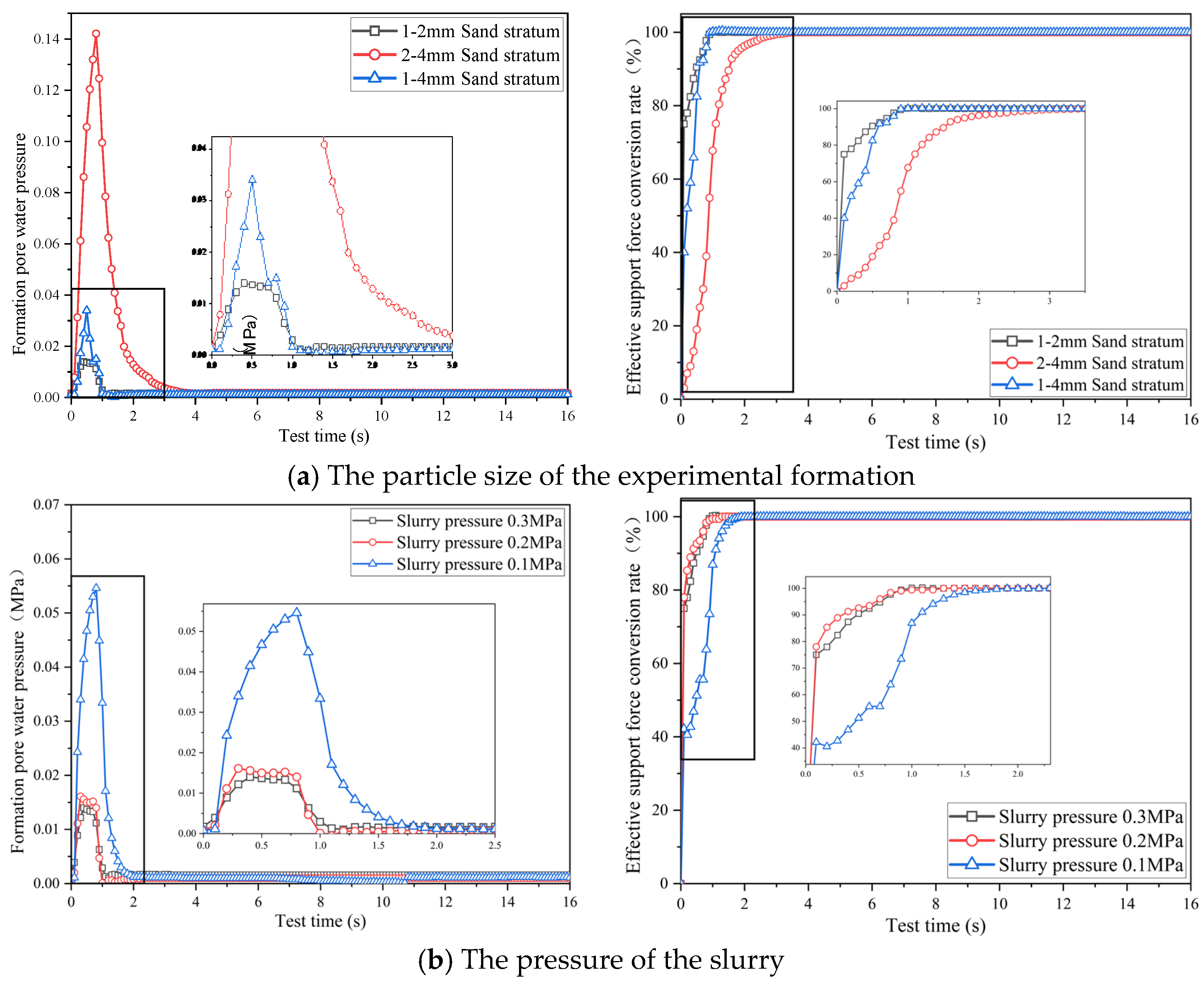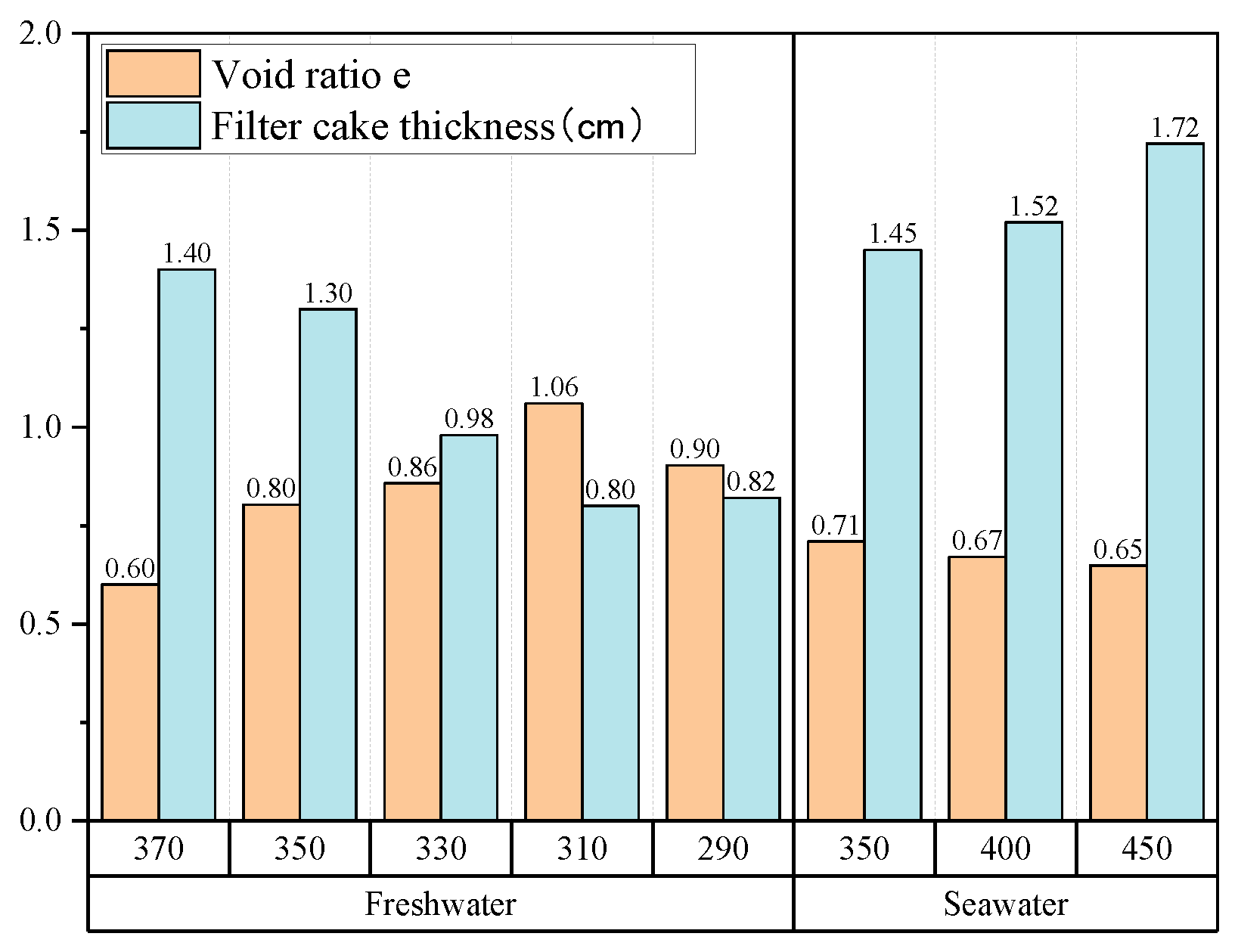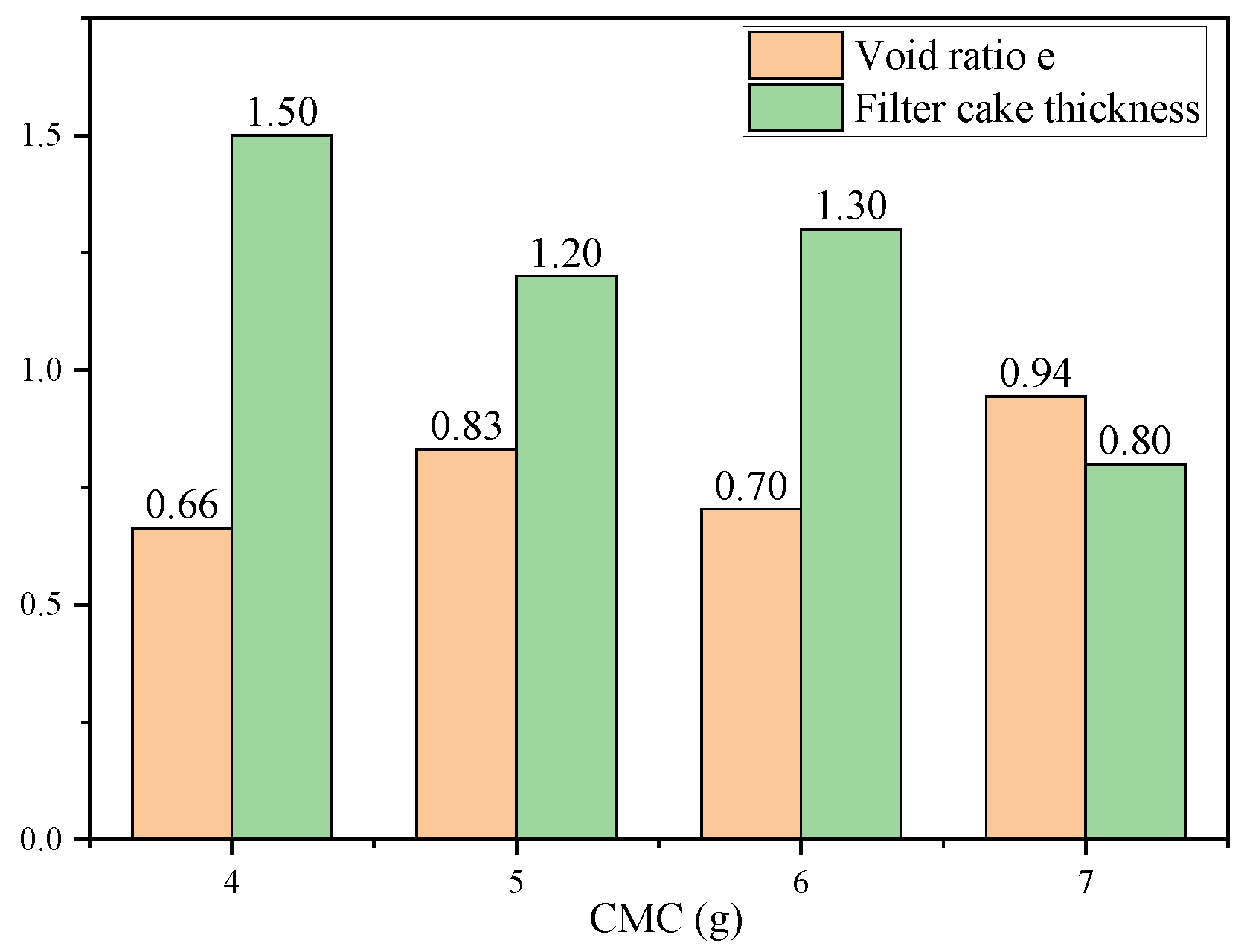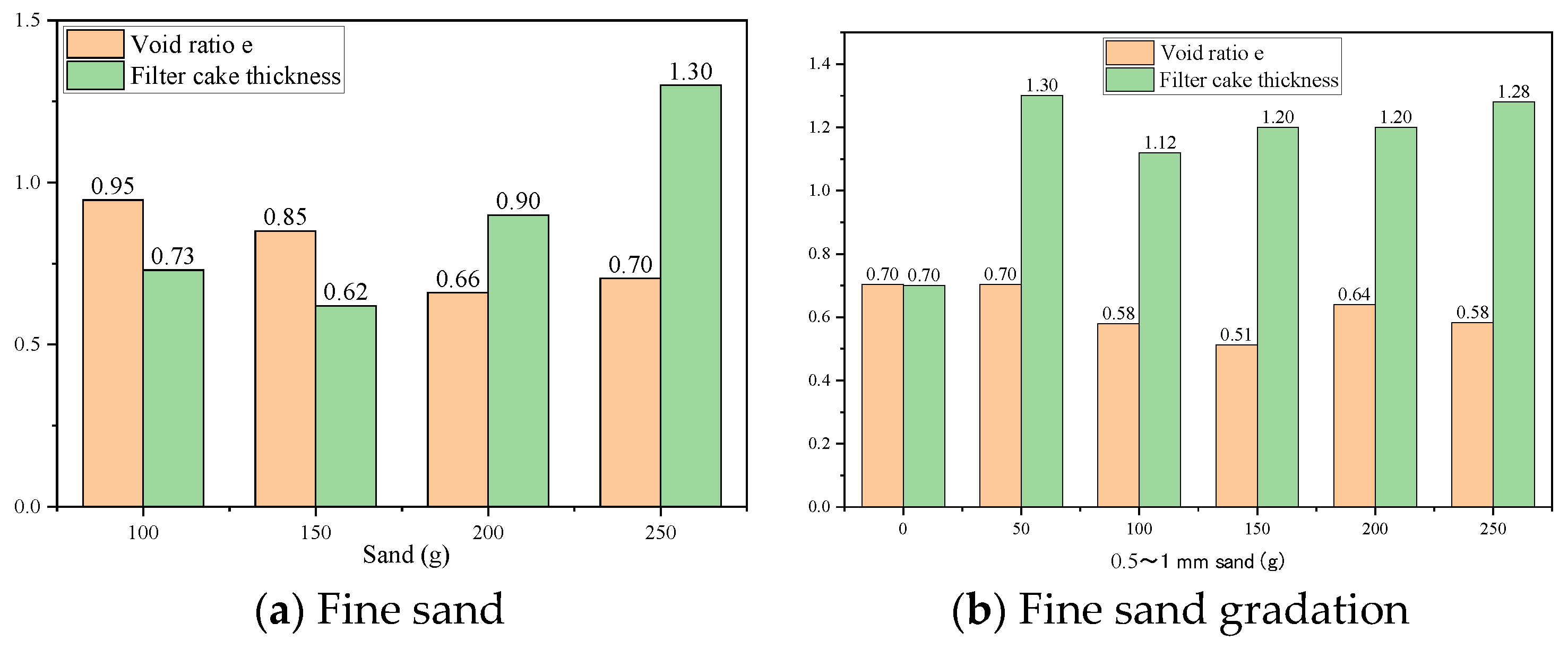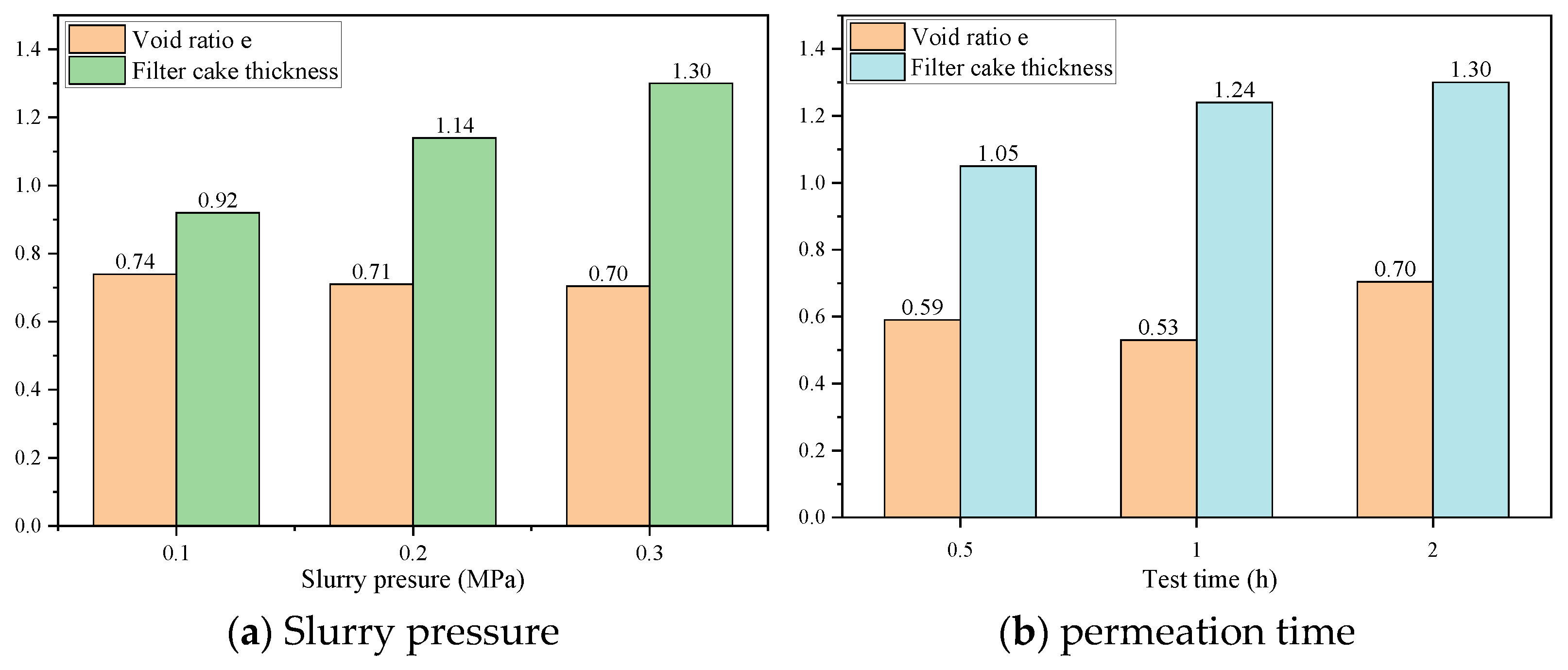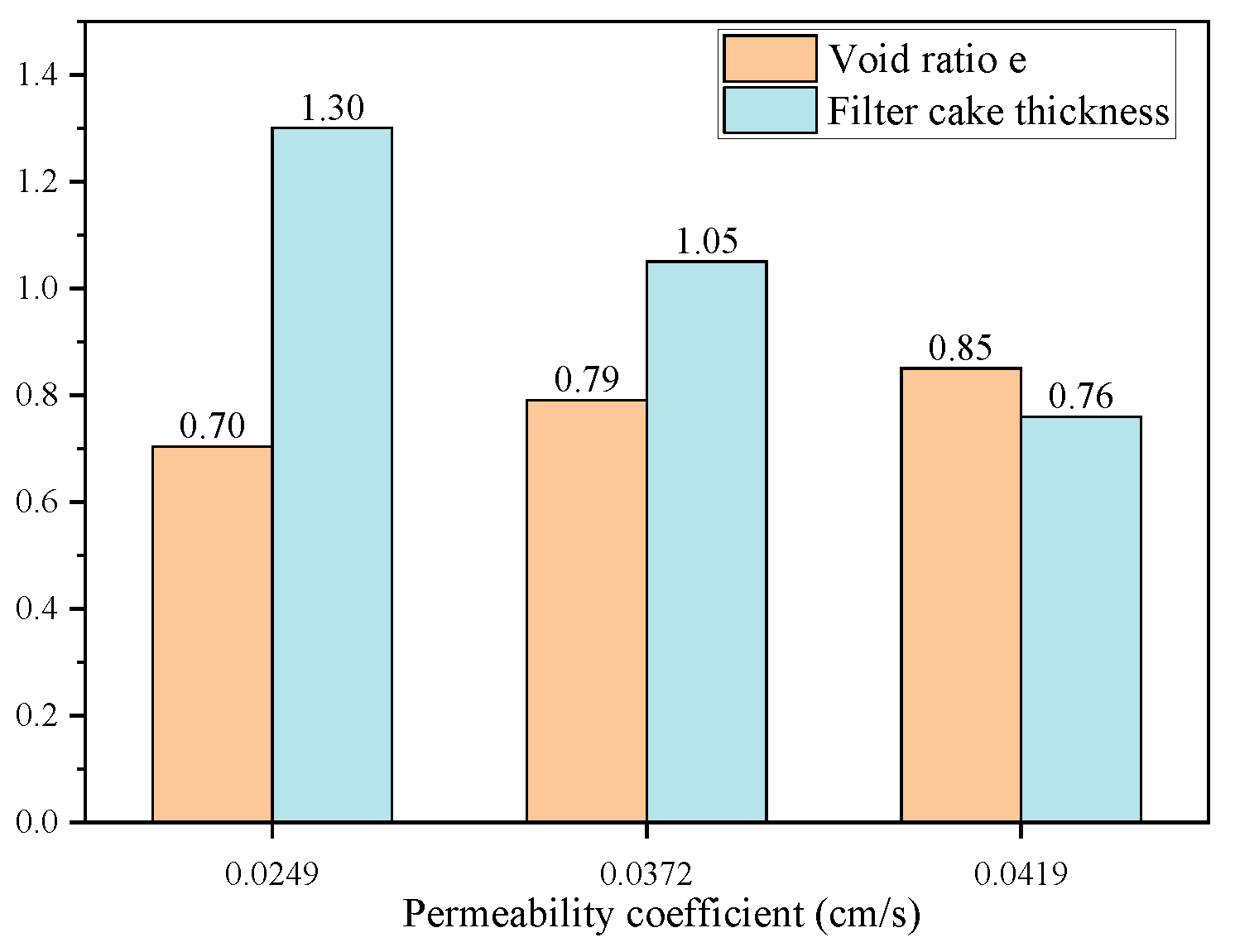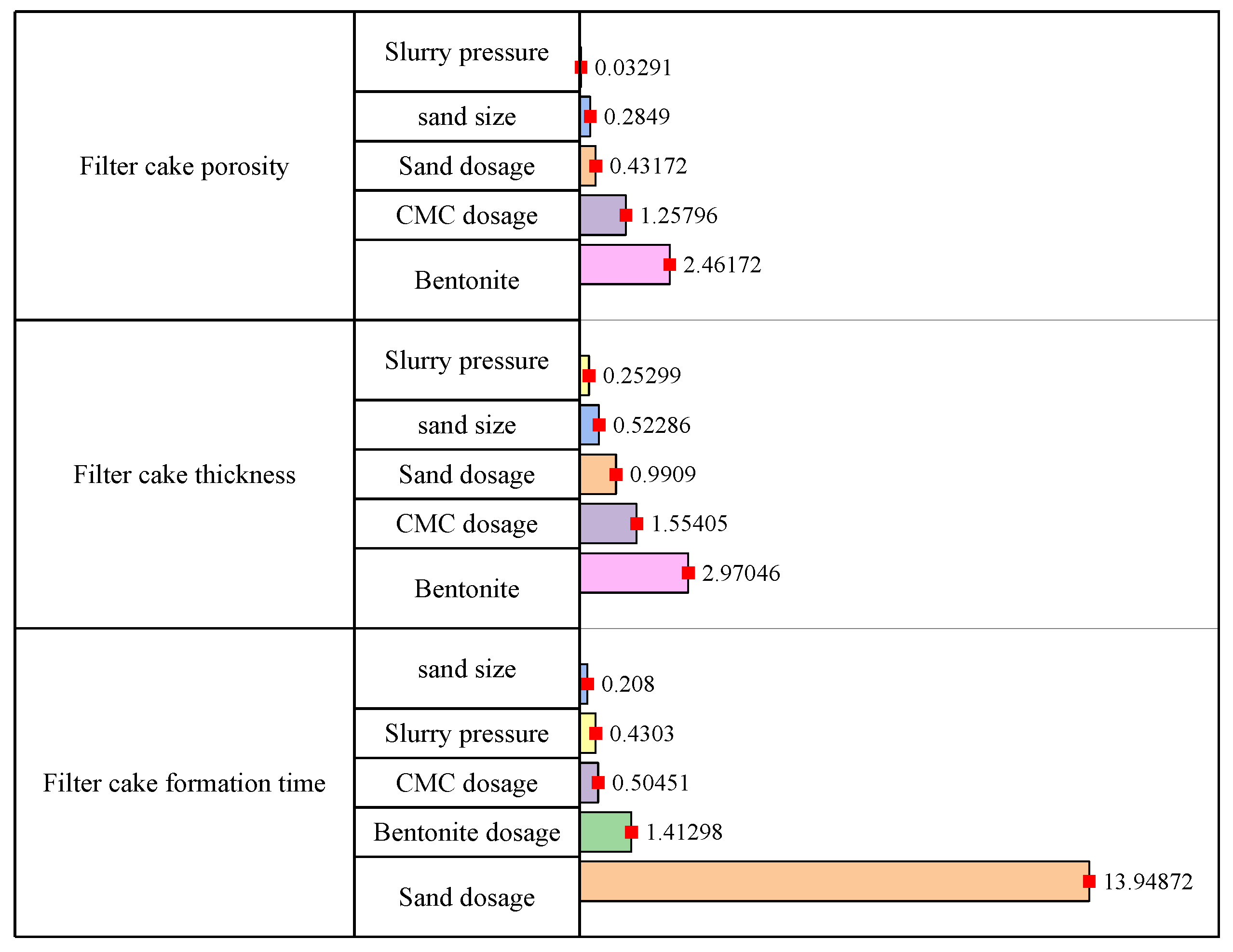Abstract
A bentonite slurry mixed with seawater is prone to sedimentation, which will reduce the quality of the filter cake and lower the stability of the excavation surface in undersea tunnels. It is necessary to study the performance and influencing factors of the bentonite slurry mixed with seawater. This article simulates the process of undersea slurry shield tunnel construction, where the pressurized slurry penetrates into the sand layer and forms a filter cake when the shield stops pressurizing. We investigated the effects of bentonite, additives (CMC), fine sand, pressure, and formation permeability on the performance of the seawater slurry and filter cake. The sedimentation of mud caused by seawater interfered with the experiment, which manifested as the increase in bentonite, and delayed the formation of the filter cake. Fine sand with a particle size close to the average value of the formation can improve the speed and quality of filter cake formation. By conducting a sensitivity analysis on experimental data, the degree of influence of various factors on the formation rate, thickness, and porosity of the filter cake was determined. Fine sand and bentonite are the factors that have the greatest impact on the formation rate, thickness, and porosity of the filter cake.
1. Introduction
The slurry balance shield (SPBS) relies on a pressurized slurry to form a filter cake at the excavation face, which resists the soil and water pressure of the strata, thereby maintaining the stability of the excavation face. When constructing tunnels under the seabed, fresh bentonite slurry mixes with seawater, transforming into a saline bentonite slurry [1], which causes the coagulation and sedimentation of the bentonite slurry. This transformation degrades the slurry’s performance, adversely affecting construction progress and safety [2,3]. Consequently, understanding the performance of bentonite slurry under seawater intrusion and its influencing factors has become a significant concern for the engineering community.
Both domestic and international scholars have extensively studied the materials and permeability performance of bentonite slurry. Most research on slurry shield tunneling, slurry preparation, and filter cakes has been focused on tunnels excavated in highly permeable strata in inland areas. These studies have shown that slurry density, viscosity, clay content, and particle size distribution in the slurry significantly impact the filter cake quality [4,5,6,7,8]. Adding particles (such as silt, sand, vermiculite) or other additives (such as polymers) to the slurry has been proven to help rapidly form dense filter cakes in highly permeable strata [9,10,11,12]. These studies also indicate that numerous parameters can be used to evaluate the filter cake quality, including water filtration during filter cake formation, the maximum pressure the filter cake can withstand, pore pressure in the strata after filter cake formation, permeability coefficient, porosity, and the filter cake air tightness time under air pressure [6,8,10,13,14,15].
Some scholars have studied the degradation mechanism and performance of seawater bentonite slurry by testing its physical stability, viscosity, and zeta potential [16,17,18]. The results show that adding seawater to bentonite slurry destroys the double-layer structure on the surface of bentonite particles, significantly reducing its stability and viscosity. Liu D et al. [19] studied the flocculation phenomenon of clay minerals, including bentonite, in saline water, and the results showed that high salinity water helps to settle bentonite and illite, but hinders kaolinite. Yu Z [20] studied the effects of ion concentration and ion valence on the stability, rheology, and permeability of bentonite slurry. Zhao Z et al. [21] found that bentonite cannot be fully hydrated and dispersed in saltwater, resulting in the inability of the slurry to be used normally. The cost of improving slurry performance by adding particles and clay minerals is very high, so additives must be added to improve slurry performance. Some scholars have studied the modification of seawater slurry using additives such as hydroxypropyl methylcellulose, ammonium polyacrylate, and yellow collagen [22,23,24,25]. Min et al. [26] investigated the influence of seawater on the microstructure of filter cakes by measuring the voids inside the filter cakes using mercury intrusion porosimetry and scanning electron microscopy. Most of the research on slurry permeability has been conducted under highly permeable strata conditions in freshwater environments. There is limited research on the performance of mud under seawater conditions, mainly focusing on the deterioration mechanism of seawater on bentonite slurry and the effects of seawater on the permeability and internal structure of filter cakes. There is a lack of research on the influence of slurry materials such as bentonite, additives, particles, and factors such as slurry pressure and strata conditions on the permeability performance of slurry and the performance of filter cakes under seawater conditions.
Based on a slurry shield tunneling model test device, this paper studies the effects of bentonite, CMC, fine sand content and gradation, strata permeability coefficient, slurry pressure, and permeability tests on the pore water pressure of the strata during slurry permeability, the effective support force conversion rate, and the thickness and porosity of the formed filter cakes under seawater intrusion conditions. The aim is to provide a theoretical foundation for slurry balance shield tunneling construction in underwater tunnels.
2. Experimental Setup
The experimental setup used in this study is an improved version of the traditional one-dimensional slurry permeability and filter cake formation apparatus, as shown in Figure 1. The device can simulate both the static filter cake formation process of the slurry and the dynamic filter cake formation process under the cutting action of the cutterhead. The apparatus can set the cutterhead rotation speed and advancement speed, and it allows for the real-time monitoring of slurry pressure, pore water pressure in the strata, and drive shaft torque during the experiment.
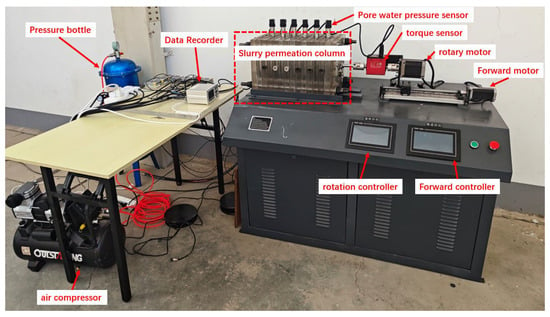
Figure 1.
Experimental setup of slurry shield tunneling model test device.
The permeation column is a container where slurry permeates, constructed by assembling polymethyl methacrylate (PMMA) panels internally featuring holes of varying diameters, as depicted in Figure 2. The interior of the permeation column, composed alternately of two types of PMMA panels, presents a textured surface that helps prevent strata compression under pressure and the leakage of slurry between the formation and the container walls [27]. Type A PMMA panels have interfaces on the sidewalls for sensor connections, with unused interfaces sealed using bolts.
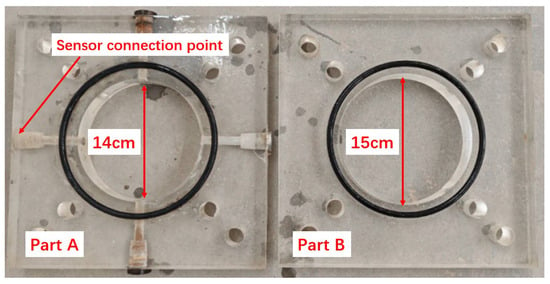
Figure 2.
Two types of PMMA panels used to construct the permeation column.
Figure 3 is a schematic diagram of the various systems of the device. The device operates by using compressed air as the driving force for slurry permeation. The slurry is placed in a pressure steel cylinder and propelled by compressed air at a fixed pressure. The slurry flows through pipelines into the permeation column where it is filtered by a sand layer material, and the filtrate enters a collection container. During slurry filtration, pore water pressure sensors on the sidewall of the permeation column record changes in slurry pressure and strata pore water pressure throughout the experiment. In the experiment, four pore water pressure sensors were installed along the direction of slurry infiltration, one of which was located above the excavation face to monitor the slurry pressure, and the other three were installed below the excavation face to monitor the pore water pressure in different positions of the formation during the slurry infiltration process. The spacing between the sensors was 30 mm.

Figure 3.
Schematic diagram of the experimental setup.
After the experiment, the effective support force conversion rate of the filter cake was calculated using the strata pore water pressure data (Equation (1)). This parameter was calculated based on measurements of strata pore water pressure at monitoring points, static water pressure, and slurry pressure during the experiment [28]. It characterizes the ability of the filter cake to convert slurry pressure into effective stress, reflecting the effectiveness of the slurry in supporting the excavation face.
In this equation, is the slurry pressure (MPa); is the hydrostatic pressure at the monitoring point (MPa); and is the excess pore water pressure at the monitoring point (MPa).
The static state test of the cutterhead was conducted without using a rotating motor or a propulsion motor. This test simulated the infiltration of the slurry on the excavation surface during the shutdown and pressure maintenance of a slurry balance shield machine. After the experiment, the cover on top of the permeation column was opened, and the excess slurry above the excavation face was withdrawn using a syringe. A custom filter cake extraction device was used to retrieve the filter cake, measuring its thickness and wet weight. After drying in a low-temperature drying oven, the dry weight was measured. The extraction process is illustrated in Figure 4.
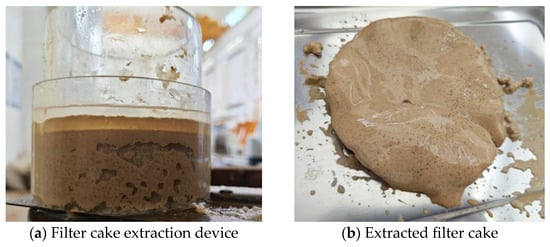
Figure 4.
Filter cake extraction.
Assuming the filter cake is fully saturated with water during the experiment, meaning its internal voids are completely filled with water, the porosity of the filter cake can be calculated using Formula (2).
In this equation, is the mass of water in the filter cake (g); represents the area of the filter cake, which is equal to the area of the sampler, ; and represents the thickness of the filter cake.
3. Experiment Scheme
3.1. Slurry Materials
The materials used to prepare the slurry, as shown in Figure 5, include sodium-based bentonite for drilling, produced by Renqiu Gaokai Chemical Co., Ltd. (Renqiu, China), sodium carboxymethyl cellulose (CMC 300–800 mPa·s), produced by Shanghai Zhanyun Chemical Co., Ltd. (Shanghai, China), fine sand (river sand, particle size less than 1 mm), tap water, and artificial seawater.
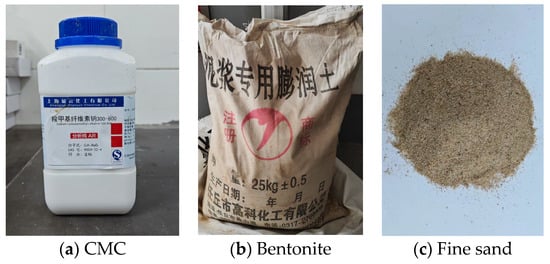
Figure 5.
Slurry materials.
Artificial seawater was prepared according to ASTM D1141-98 (2021) [29] standard, with negligible amounts of components such as potassium bromide, strontium chloride, and sodium fluoride omitted. The composition of artificial seawater components is detailed in Table 1.

Table 1.
Composition of seawater for testing.
When preparing the slurry, sodium bentonite is thoroughly dry mixed with CMC before gradually adding it to the mixing water. The mixture is stirred for 20 min in a mixer. Fine sand is then added and stirred for an additional 10 min. After mixing, the slurry is left to stand in a sealed container for 24 h. Prior to conducting the slurry permeation test, the slurry is stirred again for 30 min.
3.2. The Sand Layer Material
The strata materials used in the experiment consist of three types of quartz sand with particle sizes of 1–2 mm, 1–4 mm, and 2–4 mm (Figure 6). The material with a particle size of 1–4 mm is prepared by mixing 1–2 mm and 2–4 mm quartz sands in equal proportions.
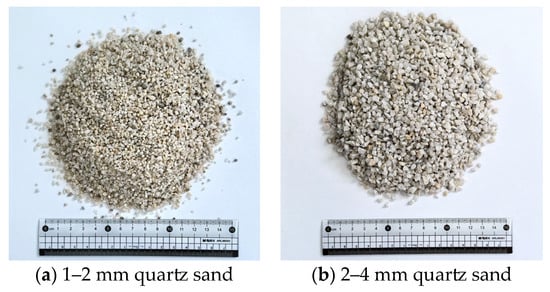
Figure 6.
Sand layer materials.
The strata materials used in the experiment are coarse-grained and loosely structured quartz sands, which effectively simulate characteristics such as high fragmentation, poor integrity, and strong permeability typical of fault zones and weathered channels [30]. Permeability coefficients for the three materials were tested using the constant head method, as shown in Table 2.

Table 2.
Formation material parameters.
3.3. The Experimental Design
According to Zhanchao Yin et al. [31], slurry stability and viscosity decrease as the proportion of seawater increases. Slurry performance generally reaches its lowest point when seawater constitutes 30% of the mixture. This suggests that conducting permeation tests using slurry with a 30% seawater content can effectively characterize the degradation of slurry permeability due to seawater.
To investigate this, a series of slurry mixtures with a 30% seawater content was prepared, controlling single factors including bentonite dosage, sodium carboxymethyl cellulose (CMC) dosage, fine sand dosage, and fine sand gradation. Simultaneously, a set of freshwater slurries with varying bentonite concentrations was prepared as controls. The experimental group is outlined in Table 3. The experiments will be conducted in strata with particle sizes of 1–2 mm, with a test duration of 2 h and a slurry pressure of 0.3 MPa.

Table 3.
Experiment on changing the slurry material.
We used the slurry formulation with ID 13 from Table 3 and conducted nine sets of experiments under different slurry pressures, permeation times, and strata conditions, as outlined in Table 4.

Table 4.
Experiment on changing other factors.
4. Factors Influencing Pore Water Pressure in the Formation Due to Slurry Permeation
(1) The influence of bentonite dosage under freshwater and seawater conditions
From Figure 7, it can be seen that the formation pore water pressure curve has three stages. In the first stage, the pore water pressure of the formation increases, and the slurry begins to penetrate through the surface of the formation. In the second stage, the pore water pressure of the formation decreases, and at this time, a filter cake is rapidly formed on the surface of the formation, which hinders the permeability of the slurry. The third stage is the stable stage, during which the filter cake is completely formed, and the slurry cannot penetrate into the formation through the filter cake.
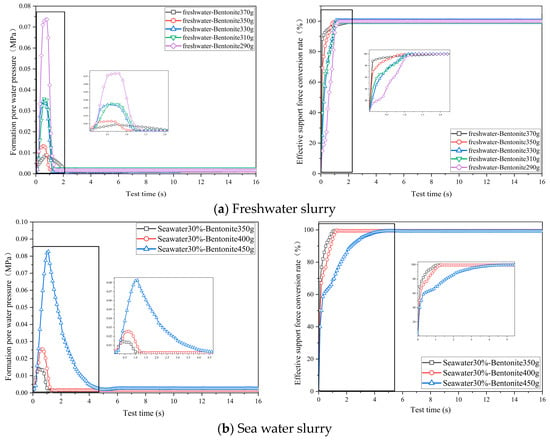
Figure 7.
Pore water pressure and effective support conversion rate of freshwater and seawater slurries.
Under fresh water conditions, the peak pore water pressure during the experiment increases with an increasing bentonite dosage. In contrast, the pattern of pore water pressure during seawater slurry experiments shows the opposite trend. Simultaneously, from the curve of the effective support conversion rate, it can be seen that under seawater conditions, increasing the bentonite dosage slows down the stabilization of the effective support conversion rate at the excavation face. This indicates that it becomes more difficult for the slurry to form an impermeable filter cake.
The reason for this phenomenon is the detrimental effect of seawater on the stability and rheological properties of the slurry. Even with approximately 3.6 times the mass of CMC added to the seawater slurry, it remained unstable. This caused precipitation shortly after the slurry was introduced into the pressure tank, leading to the rapid clogging of the excavation face by fine sand and precipitates. Only when the bentonite dosage in the seawater slurry was increased to 450 g did this situation begin to improve, providing some stability to the slurry and enhancing its ability to suspend the fine sand. This means that the seawater slurry with a lower bentonite content settles on the surface of the sand layer before the experiment begins, hindering the penetration of the slurry. The stability of seawater slurry with a higher amount of bentonite is better, and there is less precipitation formed on the excavation surface. The slurry needs to further penetrate to form a filter cake, which is manifested by the fact that the slurry with an increased amount of bentonite actually deteriorates its performance. Further increasing the bentonite dosage reduced the pore water pressure generated during the seawater slurry permeation process and shortened the time required to form the filter cake. According to Zhao Z et al. [21], the effect of improving the performance of seawater slurry by adding more clay mineral components to the slurry is poor; this is consistent with the conclusion of this article.
(2) The impact of CMC dosage
As shown in Figure 8, increasing the CMC dosage resulted in a decrease in the peak pore water pressure during the slurry permeation process, indicating that the increase in CMC reduced the slurry’s permeation in the formation, thereby minimizing disturbances to the pore water pressure in the formation. In addition, when the dosage of CMC increased from 4 g to 7 g, the time required for the effective support force conversion rate to reach stability during the slurry infiltration process decreased. This indicates that increasing the CMC dosage can reduce the formation time of the filter cake, which is consistent with the study by Liu D et al. [32]. The reason is that CMC linearly increases the viscosity of the slurry, and the higher the viscosity of the slurry, the earlier the formation of the filter cake.
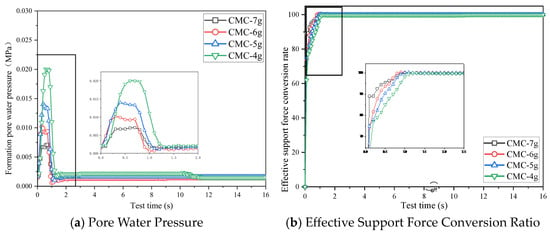
Figure 8.
Relationship between pore water pressure and effective support force conversion rate for different CMC dosage.
(3) The influence of fine sand dosage
As shown in Figure 9, when the slurry does not contain coarse particles, it completely filters out from the formation, and the effective support force conversion rate of the slurry without coarse particles does not exceed 30% in this experiment, indicating that the slurry without coarse particles cannot form a filter cake in the highly permeable formation used in this test. As the number of coarse particles decreases from 150 g to 100 g, significant changes occur in the pore water pressure and the effective support force conversion rate of the filter cake, leading to a significant increase in the filter cake formation time. The experimental results indicate that adding coarse particles when formulating a slurry under high permeability conditions can significantly improve film-forming performance.
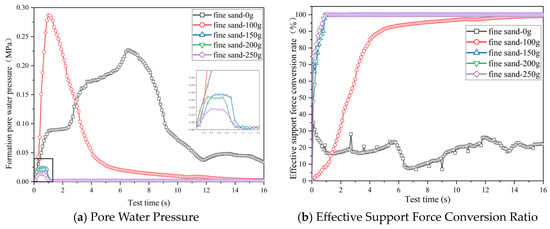
Figure 9.
Pore water pressure and effective support conversion rate of slurry with different fine sand content.
(4) The influence of fine sand particle size
As shown in Figure 10, the pore water pressure in the formation shows a pattern of initially increasing and then decreasing with the increase in the content of fine sand with particle sizes ranging from 0.5 to 1 mm. Tao Xu et al. [33] pointed out that when the slurry with added sand infiltrates, coarser particles block the excavation surface, while finer particles follow the slurry into the sand layer. This indicates that if the particle size of the sand in the slurry is reasonable, it can simultaneously block the pores of the excavation surface and sand layer, reducing the infiltration of the slurry. This is consistent with the research in this article. There exists an optimal grading of fine sand that minimizes the pore water pressure generated during the formation of the filter cake by the slurry, with the optimal ratio being m(0–0.5):m(0.5–1) = 2:3. Meanwhile, Wang Z et al. [34] pointed out that when the particle size of the slurry is close to the average particle size of the formation, the slurry has the best sealing effect on the formation pores. This is consistent with the research results of this article; when the proportion of fine sand added to the slurry reaches its optimal level, its particle size is closest to the average particle size of 0.5 mm used in permeability tests.
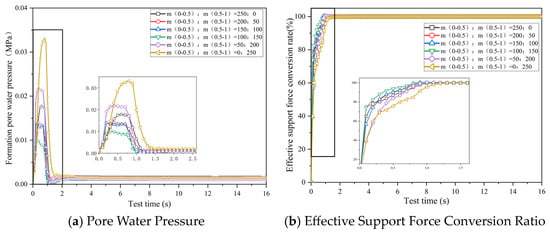
Figure 10.
Relationship between pore water pressure and effective support force conversion rate of slurry with different fine sand gradations.
(5) The influence of formation permeability and slurry pressure
Under different permeability conditions of the formations and mud pressure, the mud infiltration results are shown in Figure 11. The pore water pressure in the formation is directly proportional to the formation permeability and inversely proportional to the mud pressure. When the formation permeability is 4.19 × 10−2 cm/s and the mud pressure is 0.1 MPa, the rate of the effective support force conversion significantly slows down.
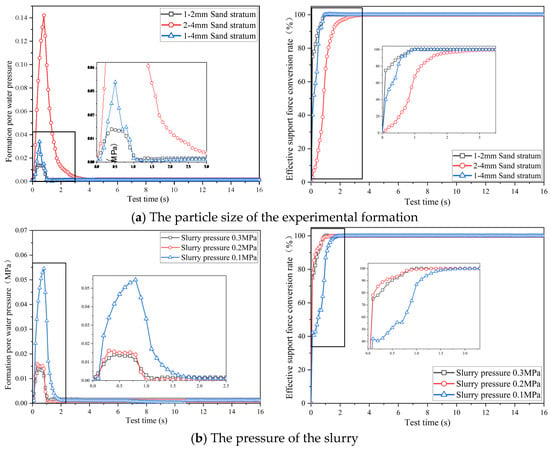
Figure 11.
Different formation and slurry pressures affect pore water pressure and effective support force conversion rate.
5. Factors Influencing Filter Cake Performance
After the permeation test, the filter cake on the formation surface was removed to measure its thickness and porosity, analyzing the relationship between various factors and the filter cake quality.
(1) The influence of bentonite dosage under freshwater and seawater conditions
As shown in Figure 12, the thickness of the filter cake formed by the freshwater slurry increased with the addition of bentonite, while the porosity showed a decreasing trend with an increasing bentonite content. In contrast, for the slurry prepared with 30% seawater, the filter cake thickness significantly increased. The amount of bentonite was directly proportional to the filter cake thickness and inversely proportional to the porosity. This is because adding seawater requires more slurry to seal the voids in the excavation face, resulting in more solids remaining on the excavation face. Additionally, the precipitation of sand and bentonite particles accelerated the thickening of the filter cake. The resulting filter cake was porous and loose, which compressed and dehydrated under pressure. After the test, the porosity of the filter cake was closer, consistent with findings reported by Du et al. [2].
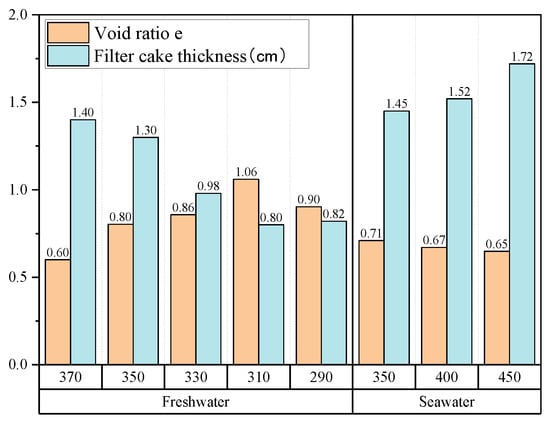
Figure 12.
Filtration performance under freshwater and seawater conditions.
(2) The impact of CMC dosage
The relationship between the CMC dosage and filter cake porosity and thickness is shown in Figure 13. Increasing the CMC dosage increases the viscosity of the slurry, making it more difficult for the slurry to permeate through the formation, resulting in a thinner filter cake. The reduced slurry penetration decreases the amount of bentonite particles in the filter cake. Simultaneously, a higher CMC content enhances the compactness of the filter cake. This reduced water loss and compression under pressure result in an increased porosity of the filter cake at higher CMC concentrations.
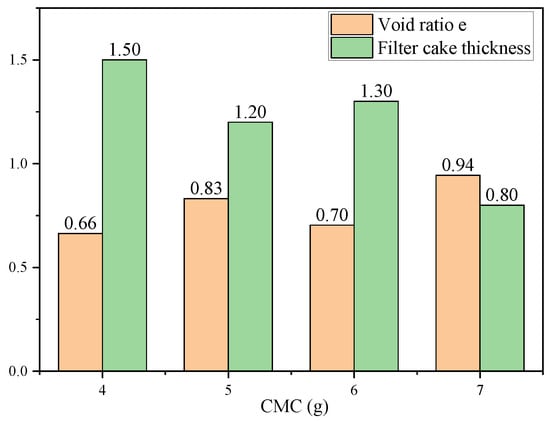
Figure 13.
Filtration cake performance under different CMC dosage conditions.
(3) The influence of fine sand dosage and particle size
Different amounts and gradations of fine sand in the slurry produce filter cakes of varying quality, as shown in Figure 14. The filter cake thickness increases with the sand content, indicating that a higher sand content promotes thicker and more compact filter cakes. However, the research results of Xu T et al. [32] and Qin S et al. [35] indicate that an excessive proportion of sand in the slurry can lead to ineffective pressure transmission to the bentonite particles, resulting in the inability to deposit and compact the bentonite on the excavation surface, and thus the inability to form a low-permeability filter cake. This can be reflected in the experimental results. From the experimental results, it can be seen that when the amount of fine sand in the slurry increases from 200 g to 250 g, the porosity of the filter cake increases slightly while the thickness increases significantly. This indicates that if the amount of fine sand is further increased, the dense part formed by bentonite particles in the filter cake will be further reduced, thereby increasing the pores inside the slurry.
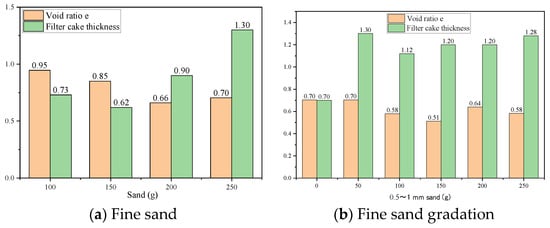
Figure 14.
Filter cake performance under sand dosage and sand grading conditions.
As the proportion of fine sand increases from 0 to 0.5 mm to include 0.5 to 1 mm particles, there is a significant increase in filter cake thickness, highlighting the negative impact of poor sand gradation on filter cake quality. The porosity of the filter cake decreases with an increasing content of 0.5 to 1 mm of fine sand, showing a trend of initial decrease followed by an increase. The minimum porosity occurs when the ratio of m(0–0.5 mm) to m(0.5–1 mm) is 2:3.
(4) The influence of slurry pressure and infiltration time
Experiments were conducted under different slurry pressures and permeation times, and the results are shown in Figure 15. As the pressure of the slurry increases, the thickness of the filter cake increases linearly, and the porosity decreases slightly. The minimum thickness and maximum porosity of the filter cake formed under a pressure of 0.1 MPa indicate that a higher slurry pressure is beneficial for improving the quality of the filter cake, which is consistent with the research of Wang H et al. [36]. As the infiltration time increases, the thickness of the filter cake gradually increases, and the porosity first increases and then decreases. When the infiltration time increases from 0.5 h to 1 h, the thickness of the filter cake increases and becomes dense under the pressure of the slurry, resulting in a decrease in the porosity. The reason for the significant increase in the porosity of the filter cake when the infiltration time increases from 1 h to 2 h is that the slurry has more precipitation at this time, which forms a loose surface layer filter cake.
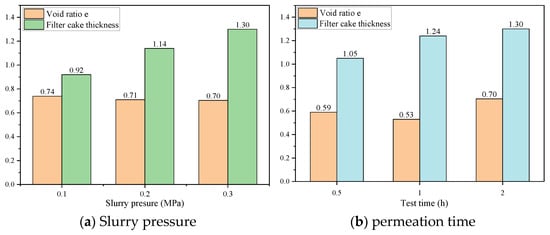
Figure 15.
Filter cake performance under different slurry pressure and permeation time conditions.
(5) The influence of geological permeability
Slurry permeability tests were conducted in three different permeability formations, and the results are shown in Figure 16. As the permeability coefficient increases, the thickness of the formed filter cake decreases while the porosity increases, indicating that the performance of the formed filter cake deteriorates when the same slurry penetrates the surface of higher permeability layers. This indicates that there is a significant risk of instability when the shield tunnel suddenly encounters high permeability layers such as fault fracture zones during excavation. When the permeability coefficient increases from 3.72 × 10−2 cm/s to 4.19 × 10−2 cm/s, the thickness of the filter cake suddenly decreases, indicating that the quality of the filter cake formed during shield tunneling in high permeability formations is poor, and the increase in formation permeability makes it more difficult to form the filter cake.
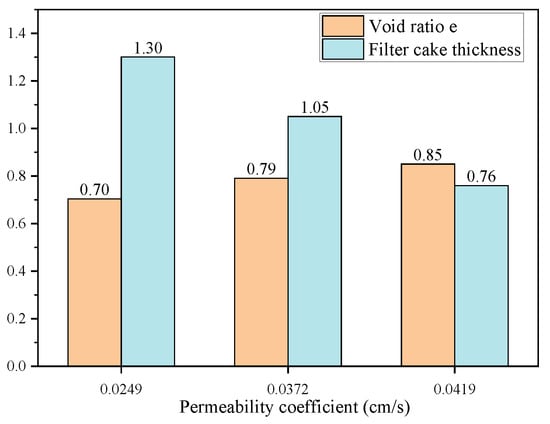
Figure 16.
Filter cake performance under different formation permeability conditions.
6. Sensitivity Analysis of Factors Affecting the Performance of Slurry Support
In order to obtain the influence of various factors on the slurry support performance and provide a theoretical basis for the control of slurry performance and other parameters, a sensitivity analysis was conducted on each factor. The factors that determine the performance of the mud support include the filter cake formation time, filter cake thickness, and filter cake porosity. The filter cake formation time is defined as the time when the effective support force conversion rate tends to stabilize. The influencing factors for analysis include the amount of bentonite, CMC, fine sand, fine sand gradation, and mud pressure. The fine sand gradation is represented by the amount of fine sand with a particle size of 0–0.5 mm. The experimental data for analysis are shown in Table 5. Among them, the grading of fine sand is represented by the amount of fine sand with a particle size of 0–0.5 mm.

Table 5.
Results of slurry infiltration test.
Due to the significant differences in numerical values among various factors, a direct comparison cannot be made, and data processing is necessary. The adjacent influencing factors and mud support performance indicators in Table 5 were calculated using Formula (3), and the results are shown in Table 6.

Table 6.
Data change rate.
In the formula, “max” and “min” are the larger and smaller values of adjacent data, and ∆ represents the rate of change of the data.
The average value of the data was calculated for each influencing factor in Table 6 by column, and then, Equation (4) was used to obtain the quality indicator change rate under the unit average influencing factor change rate. The calculated results are shown in Table 7.

Table 7.
Data analysis results.
In the formula, “a” represents the average rate of change in the film formation time, filter cake thickness, and filter cake porosity; “b” is the average rate of change for each influencing factor.
The values in Table 7 represent the impact of the average unit change for each factor on the filter cake formation time, filter cake thickness, and filter cake porosity. The data were then sorted, as shown in Figure 17.
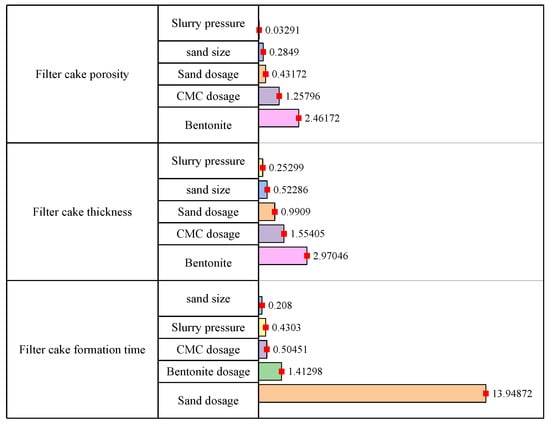
Figure 17.
The influence of various factors on the performance of mud support.
The influence of the amount of fine sand on the formation rate of the filter cake is significantly higher than other factors, and the amount of bentonite has the greatest impact on the quality of the filter cake. CMC is a significant factor affecting the thickness and porosity of the filter cake. According to the experimental results, an increase in the CMC dosage leads to a decrease in the filter cake thickness and an increase in porosity. This indicates that the impact of increasing the CMC dosage is negative. When preparing the slurry, a comprehensive consideration should be given to the dosage of bentonite and CMC, and the viscosity of the slurry cannot be improved by significantly increasing the CMC dosage.
The influence of mud pressure on the quality of the filter cake is relatively small, indicating that the formation of a dense filter cake on the excavation surface mainly relies on the control of mud material. Compared to the quality of the filter cake, the influence of mud pressure on the formation speed of the filter cake has been improved to a certain extent, indicating that in scenarios such as shield tunneling that require a repeated generation of the filter cake, increasing mud pressure helps to maintain the integrity of the excavation face filter cake.
7. Conclusions and Discussion
This article characterized the stability of the excavation face of a slurry shield undersea tunnel from four aspects: the formation pore water pressure caused by slurry infiltration, the time for the slurry to form a filter cake, the thickness of the filter cake, and the void ratio of the filter cake. These four aspects represent the disturbance of slurry infiltration on the soil after excavation, the speed at which the excavation surface rebuilds balance after cutting with cutting tools, and the shielding ability of the filter cake formed by the slurry on the excavation surface.
The experimental results and data analysis indicate that bentonite is the main component of the filter cake shielding effect, but seawater greatly damages its dispersion effect, making it unable to function properly. CMC improves the viscosity and stability of the slurry but has a negative effect on the thickness and density of the filter cake. Perhaps some bentonite can be replaced with a less active clay and more additives can be added to maintain the balance between the formation rate and quality of the filter cake. Fine sand significantly increases the speed of the filter cake formation, which is beneficial for the performance of the filter cake when the content is low, and harmful when the content is high. At the same time, the particle size of fine sand has an impact on its effectiveness. A higher slurry pressure and a longer holding time of the slurry pressure contribute to the formation and development of the excavation face filter cake. The experiments conducted under different geological permeabilities represent the impact of sudden geological changes during shield tunneling on the permeability behavior of the slurry at the excavation face. The sudden increase in geological permeability may indicate that the shield machine has entered a new environment or that there are defects in the excavated soil, causing the rapid loss of slurry and a significant decrease in the performance of the filter cake formed at high permeability locations.
The above discussion indicates that it is difficult to configure a slurry suitable for excavation in saline water environments, high permeability, and geological environments with many defects. This requires the coordination of various slurry materials to achieve a balance between the speed of forming the filter cake and the quality of the filter cake. Simultaneously adjusting the slurry pressure and other conditions to ensure that the slurry is in a good working environment, monitoring the slurry consumption and other parameters that can characterize the environment in which the shield machine is located, and making necessary adjustments to the slurry in a timely manner, are required.
The specific conclusions drawn from this article are as follows:
(1) Under the experimental conditions, an increase in the amount of bentonite resulted in an increase in the pore water pressure of the formation under seawater conditions and prolonged the stability time of the effective support force conversion rate. This abnormal phenomenon is caused by the decrease in the dispersibility of bentonite due to seawater. Adding bentonite improved the suspension ability of the slurry on fine sand, which reduced the positive effect of excavation surface sediments on filter cake formation in the initial stage of the experiment. Further increasing the amount of bentonite to maintain the stability of the slurry for a certain period of time reduces the interference of precipitation on the experimental results. The increase in the CMC dosage reduces the pore water pressure in the formation, resulting in a decrease in filter cake thickness but an increase in porosity.
(2) The amount and grading of fine sand are key factors affecting the quality of the filter cake. The addition of particulate matter helps to form filter cakes on the surface of high permeability formations. The optimal fine sand gradation is m(0–0.5):m(0.5–1) = 2:3. The filter cake formed under this ratio has the lowest porosity and a higher density, significantly improving the quality and support capacity of the filter cake.
(3) The pressure of the slurry and the permeability of the formation have a significant impact on the permeability of the slurry and the quality of the filter cake. Higher slurry pressure helps to form thicker filter cakes and reduces porosity. In high permeability formations, the thickness of filter cake significantly decreases and the porosity increases, indicating that high permeability formations have adverse effects on the quality of the filter cake and increase the risk of excavation face instability during excavation.
(4) The dosage of fine sand and bentonite are the factors that have the greatest impact on the formation rate, thickness, and porosity of the filter cake. When preparing a slurry, a comprehensive consideration should be given to the dosage of bentonite and CMC, and the viscosity of the slurry cannot be improved by significantly increasing the CMC dosage.
Author Contributions
Conceptualization, H.D. and Z.L.; Methodology, H.D.; Investigation, Y.L.; Data curation, H.D.; Writing—original draft, H.D.; Writing—review & editing, D.W., J.Z. and L.Z. (Lianzhen Zhang); Supervision, Z.L., Q.Z., J.Z., L.Z. (Lianzhen Zhang) and L.Z. (Luchen Zhang); Project administration, D.W. and Z.L.; Funding acquisition, D.W. and Z.L. All authors have read and agreed to the published version of the manuscript.
Funding
This paper was completed under the support of the National Key R&D Program of China (2021YFB2600800) and National Natural Science Foundation of China (No. 52171267).
Data Availability Statement
The original contributions presented in the study are included in the article, further inquiries can be directed to the corresponding author.
Conflicts of Interest
The authors declare no conflict of interest.
References
- Zhang, C.; Bezuijen, A. Seawater circulation in the slurry TBM excavation chamber and its influence on the permeability of bentonite. Tunn. Undergr. Space Technol. 2024, 146, 105672. [Google Scholar] [CrossRef]
- Jiarui, D.U.; Fan-lu, M.I.N.; Zhan-hu, Y.A.O. Experimental study on changes in slurry and filter cake properties of mud water shield tunneling under seawater intrusion conditions. Tunn. Constr. (Chin. Engl.) 2018, 38, 7. [Google Scholar]
- Lv, Q.; Sun, Z.; Yang, Z.; Chen, R.; Zhang, B. Experimental study on the performance of shield tunneling slurry in seawater environment. Tunn. Constr. (Chin. Engl.) 2019, 39, 8. [Google Scholar]
- Wu, D.; Zhou, S.; Wen, X. Laboratory Test and Application of Filter Cake Formation in Sand During Slurry Shield Construction. Chin. J. Rock Mech. Eng. 2015, 34, 3460–3467. [Google Scholar]
- Xu, T.; Bezuijen, A. Bentonite slurry infiltration into sand: Filter cake formation under various conditions. Geotechnique 2019, 69, 1095–1106. [Google Scholar] [CrossRef]
- Min, F.; Zhu, W.; Han, X. Filter cake formation for slurry shield tunneling in highly permeable sand. Tunn. Undergr. Space Technol. Inc. Trenchless Technol. Res. 2013, 38, 423–430. [Google Scholar] [CrossRef]
- Min, F.L.; Zhu, W.; Han, X.R.; Zhong, X.C. The Effect of Clay Content on Filter-Cake Formation in Highly Permeable Gravel. In Proceedings of the Geoshanghai International Conference, Shanghai, China, 3–5 June 2010. [Google Scholar]
- Han, X.R.; Zhu, W.; Liu, Q.W. Influence of slurry property on filter cake quality on working face of slurry shield. Rock Soil Mech. 2008, 29, 288–292. [Google Scholar]
- Heinz, A. Modified Bentonite Suspensions for Geotechnical Construction in High Permeability Soils; Swiss Federal Institute of Technology ETH: Zurich, Switzerland, 2006. [Google Scholar]
- Fritz, P. Additives for Slurry Shields in Highly Permeable Ground. Rock Mech. Rock Eng. 2007, 40, 81–95. [Google Scholar] [CrossRef]
- Wei, L.W.; Zhang, Q.H.; Deng, Z.Y. Research on Mechanism and Application of Face Stability in Large Slurry Shield Tunneling. Chin. J. Undergr. Space Eng. 2007, 3, 87–91. [Google Scholar]
- Ru, J. Experimental study on the effect of sand content in slurry on the film-forming performance of slurry for slurry shield tunneling. China Saf. Prod. Sci. Technol. 2022, 18, 191–197. [Google Scholar]
- Min, F.; Zhu, W.; Lin, C.; Guo, X. Opening the excavation chamber of the large-diameter size slurry shield: A case study in Nanjing Yangtze River Tunnel in China. Tunn. Undergr. Space Technol. Inc. Trenchless Technol. Res. 2015, 46, 18–27. [Google Scholar] [CrossRef]
- Zhang, N.; Zhu, W.; Min, F.; Xu, J. Microscopic pores of filter membranes and permeability during chamber opening under high pressure in slurry shield. Chin. J. Geot. Eng. 2017, 39, 495–500. [Google Scholar]
- Zhang, N.; Zhu, W.; Min, F.; Xu, J. Study on the micro pores and permeability of filter cake during pressurized opening of slurry shield tunneling. J. Geotech. Eng. 2017, 39, 6. [Google Scholar]
- Qin, S.; Zhou, W.-H.; Xu, T. Effects of seawater on the infiltration behavior of bentonite slurry into sand. Constr. Build. Mater. 2023, 371, 130759. [Google Scholar] [CrossRef]
- Ohtsubo, M.; Ibaraki, M. Particle-size characterization of flocs and sedimentation volume in electrolyte clay suspensions. Appl. Clay Sci. 1991, 6, 181–194. [Google Scholar] [CrossRef]
- Sun, J.; Zhong, X.; Fu, W.; Luo, J.; Deng, Y. Experimental study on the influence of different cations on the stability of slurry for slurry shield tunneling. J. Geotech. Eng. 2020, 42, 1525–1531. [Google Scholar]
- Liu, D.; Edraki, M.; Berry, L. Investigating the settling behaviour of saline tailing suspensions using kaolinite, bentonite, and illite clay minerals. Powder Technol. 2018, 326, 228–236. [Google Scholar] [CrossRef]
- Yu, Z. Study on the Influence of Salt Solution on the Engineering Properties of Sodium Bentonite; Zhejiang University: Hangzhou, China, 2019. [Google Scholar] [CrossRef]
- Zhao, Z.; Chen, S.; Zhou, F.; Wei, Z. Gel Stability of Calcium Bentonite Suspension in Brine and Its Application in Water-Based Drilling Fluids. Gels 2022, 8, 643. [Google Scholar] [CrossRef]
- Yang, Z.; Chen, J.; Sun, Z.; You, Y.; Zhou, J.; Lv, Q. Experimental study on the modification of seawater slurry for slurry balance shield tunneling. Geotech. Mech. 2020, 41, 501–508. [Google Scholar]
- Liu, L.; Xia, P.; Lv, H.; Lv, H.; Wang, Y.; Li, P.; Min, F. Changes in properties of CMC modified seawater slurry and experimental study on sand formation film formation. Mod. Tunn. Technol. 2022, 59, 249–255. [Google Scholar]
- Tan, X.; Yu, Y.; Li, Z. Experimental study on the preparation of seawater slurry for slurry shield tunneling. New Build. Mater. 2021, 48, 35–38. [Google Scholar]
- Sun, J.; Zhong, X.; Fu, W.; Luo, J.; Deng, Y.; Wang, H. Experimental study on the deterioration of slurry for cross sea tunnel slurry shield tunneling. Tunn. Constr. (Chin. Engl.) 2020, 40, 231–237. [Google Scholar]
- Min, F.; Du, J.; Zhang, N.; Chen, X.; Lv, H.; Liu, L.; Yu, C. Experimental study on property change of slurry and filter cake of slurry shield under seawater intrusion. Tunn. Undergr. Space Technol. 2019, 88, 290–299. [Google Scholar] [CrossRef]
- Lin, Y.; Fang, Y.; He, C.; Wang, W. Experimental study on degree of match between slurry and ground based on particle retention rate. Tunn. Undergr. Space Technol. 2021, 116, 104105. [Google Scholar] [CrossRef]
- Wei, D.; Zhu, W.; Min, F. Experimental study on the formation time of filter cake and the conversion rate of slurry pressure in sand soil layer slurry shield tunneling. Geotech. Mech. 2014, 35, 6. [Google Scholar]
- ASTM D1141-98; Standard Practice for the Preparation of Substitute Ocean Water. ASTM International: West Conshohocken, PA, USA, 2021.
- Ding, H. Seepage Law and Water Inflow Prediction of Weathering Groove Surrounding Rock in Xiamen Subsea Tunnel; Southwest Jiaotong University: Chengdu, China, 2019. [Google Scholar] [CrossRef]
- Yin, Z.; Zhang, Q.; Zhang, X.; Li, X.; Zheng, D. Effect of seawater on bentonite slurry and its infiltration behavior into saturated sand for tunnelling. Bull. Eng. Geol. Environ. 2024, 83, 178. [Google Scholar] [CrossRef]
- Liu, D.; Liu, X.; Lin, C.; Xiong, F.; Han, Y.; Meng, Q.; Zhong, Z.; Chen, Q.; Weng, C. Experimental study and engineering application of slurry permeability mechanism of slurry shield in circular-gravel stratum. Arab. J. Geosci. 2020, 13, 1000. [Google Scholar] [CrossRef]
- Xu, T.; Zhou, W.H.; Bezuijen, A.; Qin, S. Effects of sand and slurry characteristics on pressure infiltration of bentonite slurry into sand. Géotechnique 2024, 74, 935–946. [Google Scholar] [CrossRef]
- Wang, Z.; Wang, Y.; Feng, D.; Zhang, J.; Liu, S. Effects of slurry viscosity and particle additive size on filter cake formation in highly permeable sand. Undergr. Space 2022, 7, 151–161. [Google Scholar] [CrossRef]
- Qin, S.; Xu, T.; Zhou, W.-H.; Bezuijen, A. Infiltration behaviour and microstructure of filter cake from sand-modified bentonite slurry. Transp. Geotech. 2023, 40, 100963. [Google Scholar] [CrossRef]
- Wang, H.; Chen, J.; Liu, H.; Guo, L.; Lu, Y.; Su, X.; Zhu, Y.; Liu, T. Study on the influence of mud properties on the stability of excavated face of slurry shield and the quality of filter cake formation. J. Mar. Sci. Eng. 2020, 8, 291. [Google Scholar] [CrossRef]
Disclaimer/Publisher’s Note: The statements, opinions and data contained in all publications are solely those of the individual author(s) and contributor(s) and not of MDPI and/or the editor(s). MDPI and/or the editor(s) disclaim responsibility for any injury to people or property resulting from any ideas, methods, instructions or products referred to in the content. |
© 2024 by the authors. Licensee MDPI, Basel, Switzerland. This article is an open access article distributed under the terms and conditions of the Creative Commons Attribution (CC BY) license (https://creativecommons.org/licenses/by/4.0/).

